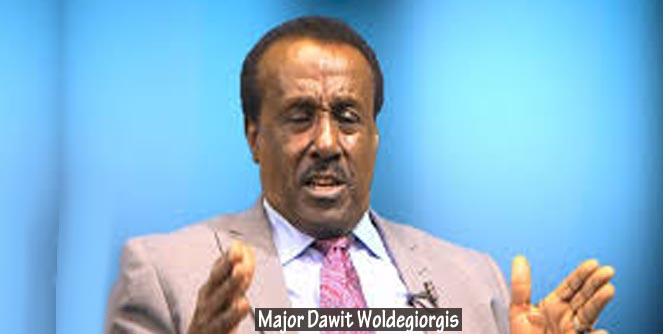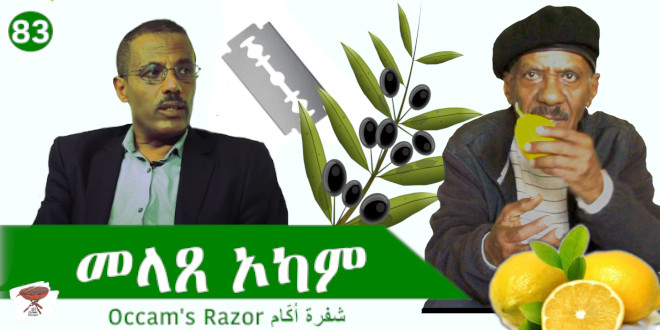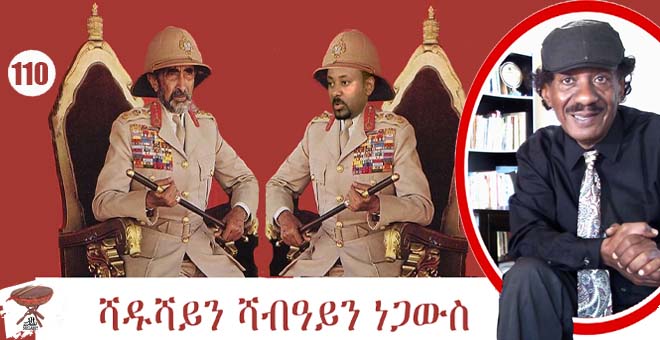Major Dawit Invites Me to Dr. Abiy’s Addition Class

This article first appeared on Jul 16, 2018. It was republished in December, 2019 with the hope it will evoke a reflection. It finally did: Major Dawit Woldegiorghis has changed his position. He has become so critical of Dr. Abiy’s performance he is branding Ethiopia “a terrorist state”. I do not claim to see the future, but I swum against the tide simply because I was guided by a timeless Eritrean saying: One can discern if a bread will be enough of a meal, when it is still baking.” I knew Dr. Abiy will not provide a satisfying political meal.///Saleh “Gadi” Johar
If there is anything Eritreans and Ethiopians (and beyond) agree upon, it is the fact that PM Abiy has stirred a seemingly calm sea. Undoubtedly he has inspired many people—he even made the stiff Isaias giggle and behave like a teenager. Of course, he has embarked in a grand scheme of adding anyone to his mesmerizing love-mix, and his aggressive quest for limitless peace has already created losers and winners defeating his “Medemer (addition)” formula, where his addition has become a subtraction, at least on the surface, kicking out some Eritreans and some Ethiopians–what an outcome for such a grand undertaking.
So far, the oppressed Eritreans have lost round one and they reckon it is time for a rebound. And sadly, people of goodwill are anxious, thinking about the loss, which, unless mitigated, might drive Eritreans and Ethiopians back to the station they departed from almost sixty years ago.
It is mindboggling to see forces that wreaked havoc in the lives of the two peoples being applauded as peacemaker while those who have been promoting peace and stability, at great costs, being portrayed as anti-peace forces. Also, sadly, it has reached to a point where my friend Major Dawit Woldegiorgis, in his article of June 28, 2018, entitled “The Moment of Truth for Eritrea and Ethiopia” urged me and “[my] colleagues and other oppositions to the Eritrean government [to] see this as an opportunity for change [from] within.” Basically, Major Dawit is asking me to add (Medemer) myself to the mix. Unfortunately, I do not fancy elementary one-digit additions; I am preoccupied with my own seven-digit addition exercise.
My record, calling for peace and reconciliation, is well established and over the years I have stated my views clearly, repeatedly, and insistently. Incidentally, I have stated it in a detailed speech in San Jose six-years ago when I first met Major Dawit face to face. I still hold to those views, and I hope he and his many colleagues, the irritating elite, who believe they have a divine mandate to lord over the two countries, would consider my points which I will explain here for the umpteenth time:
The Abyssinian Factor
I am afraid that most Ethiopian elites have no clue about Eritreans whom they have been deafening with their superficial “and hzb nen (we are one people)” empty slogan. Disappointingly, what they consider as Eritrea is only its Abyssinians component (Habesha): Tigrinya speaking, Tewahdo professing, Kebessa dwelling. Though a Habesha myself, surprisingly, in their minds I am not included in that fold except as an appendage because I was born to a family that doesn’t have the two worthy identity traits they recognize.
Historically, Habesha covered the Eritrean, Tigrayan, and Amhara highlands—it is narrowly defined as the domain of the ancient Axumite kingdom. However, due to historical developments, particularly since the “Solomonic dynasty” took over the reigns of power in Gondar (a topic so vast to be addressed here), that identity became narrowly associated with the Amharic and Tigrinya speakers of the region before it became even narrower to exclude some chunks off the stock. Today, while half of the Eritrean population do not identify themselves as Habesha, a big portion of the Habesha Eritreans are offended if identified as Habesha, because the PFDJ has inculcated the hate for the term, and they claim they are “Eritreans only, not Habesha.” They even have T-Shirts displaying that negation. It’s so sad they have given up their identity because they abhor sharing it with the “Weyane” who have been at war with them since 1998.
Similarly, the non-Habesha Eritreans consider it an insult by the elite who would rather have them melt down into the Habesha, or worse, be treated as second-class citizens in their own country. That I know deeply because I was born and raised in a town that is considered a microcosm of Eritrea, my psyche belongs to there, and I know enough about the Eritrean layers of identities. So, I think it will be wise for the Ethiopian elite to abandon the racist Habesha-centric campaigning.
Major Dawit’s statement illustrated my point: he stated he was “in the Sudan where there are hundreds of thousands of Eritrean and Ethiopian refugees. They are one and they call themselves ‘habeshas’. I established the Eritrean and Ethiopian Association of Refugees so that it should make it easier for them to get funds and also enable them to protect their rights as refugees.”
Undoubtedly, I can surmise from the above there was not a single non-Habesha in the association he established. As he has clearly illustrated, his fixation, like the rest of the irritating elite, is Habesha-centric.
Tired of Repeating This
Throughout history, the bloodshed, violence, enslavement, and oppression were conducted by, and were a result of inter-Habesha elite feud and rivalry. The ordinary Habesha and non-Habesha alike had to pay the heavy price for the adventures of the Ethiopian warlords and those who inherited their hegemonic aspirations. Therefore, recognizing that fact and diligently working to bring a closure to it will go a long way towards reconciliation. Call it computing as opposed to elementary addition.
Major Dawit often explains his stay in Eritrea, his love escapades, and his career as a soldier, in a very sentimental way. However, he never wrote an honest appraisal of the atrocities that were committed on Eritreans, about the gruesome stuff I witnessed since early childhood. Certainly, atrocities and oppression don’t happen in a vacuum, but through agents who execute them. I will like to remind Major Dawit who the agents were: In the past, they were the king’s and the Derg’s men with guns, soldiers who torched dozens of villages, killed and displaced tens of thousands of people who are still languishing in refugee camps in The Sudan, Yemen, and Ethiopia. In the present, it is his friends, the PFDJ, who have imprisoned thousands of people and caused the exile of hundreds of thousands and are relentlessly wreaking havoc all over the place. I wish the elite could remember all of that—it’s the secret to understanding the psyche of Eritreans who yearn for a closure but are insulted instead.
A few vocal elements like me buying into the retail arithmetic of addition cannot solve anything unless the refugees, the exiled, and the prisoners are added in numbers more than a few digits–when you add salt in a dish, you don’t add individual grains separately, you add it in bulk. Therefore, I would subscribe to Dr. Abiy’s addition arithmetic, when it becomes mathematics and helps in adding Eritreans in their own country—that will be the challenging math of adding in seven digits, and it will be an all-encompassing developed math. Worse, adding an embarrassing tyrant to the mix, a man who keeps subtracting tens of thousands of Eritreans every day, is not appealing.
I think Major Dawit should appreciate the distance his country has traveled since 1991. That journey, with all its shortcomings, is an impressive trip that has paved the way for Ethiopia to have a leader like Dr. Abiy. It is a journey that enabled parties to compete and assert their ballot box muscles, and it is one that allowed Ethiopians to debate their affairs freely, to demonstrate and express themselves, and it has enabled the prime minister to free prisoners and bring back exiles in droves. Disappointingly, Major Dawit, could not even shyly mention in comparison, the tragedy that Eritreans are subjected to under his friends, the PFDJ. He doesn’t express a word of compassion in solidarity with the suffering Eritreans while he displays superficial agonies over the lack of unity between Eritreans and Ethiopians, a unity for which his wishes lavishly flow like a wild beehive honey. For instance, Major Dawit worked closely with Petros Solomon in the eighties. Now his old friend Petros is languishing in jail together with his wife–did the Major entertain the idea of adding Petros in the Medemer exercise? I say that because I am not in prison and I can always add myself anytime I wish.
Just Emotions, Unjust Emotions
It is disheartening to see the elite urging the people to switch off their suffering-sensors so that they can be added in the one-digit arithmetic. Just disappointing.
In a shocking finger slip, Major Dawit writes, “What Ethiopians and Eritreans were waiting for was the right leadership.” I wonder why it is put in the past tense! For Eritreans, it should be in the present continuous tense. How can one forget Eritreans ARE still waiting for the right leadership!
Change in Ethiopian leadership doesn’t necessarily translate to change in the Eritrean leadership, even if the tyrant seemed to unilaterally delegate his dictatorship rights to Dr. Abiy, who gleefully accepted the offer! But regardless, I truly believe that positive changes in Ethiopia could become a catalyst and have a domino effect on Eritrea. I just wish the Ethiopian elite would be thrifty with their pontification and stop sabotaging the Eritrean struggle for normalcy, good governance, and yes, peace, with Ethiopia and every other country–Eritreans need to reconcile their books that are all in red, and that is their own mathematical exercise.
The fear that, “the accumulating anger would eventually explode and lead to [another 30-year war”, though expressed in a different context, will happen if the elite does not correct its approach to Eritrea and stop considering it a Habeshaland whose only significance is grabbing the prized Red Sea coast. The Major missed that Eritrea is more than that and he veils the fact that the governments under which he served have tried, “a different approach both politically and militarily.” In fact, they tried all possible methods. Subjecting Eritreans to another adventurous cycle is just cruel. And I still do not understand how he can absolve his ally Isaias Afwerki and his Ethiopian foes for subjecting the region to “a very unnecessary war that cost too many lives and put the two countries on a permanent state of war for over 20 years.” I suppose Major Dawit respects court rulings, access to which is a click away—clear and not in finetext.
If someone fights against himself, he is either insane or it’s a surreal incident; like a tango, fighting takes at least two. Yes, “the Weyane wanted [the border war],” but the major conveniently forgot the PFDJ boss wanted that as well–the major’s one-eyed spectacles worries me a lot.
It’s dangerous to attempt a rewriting of history when one seems to agonize over the violent past: “the two people have been one and need to be one for more than one reason.” That rings hegemonic—why does the major reject the Weyane and at the same time salivate to embrace the PFDJ? There is a clear double-standard, and there are knots that he needs to untangle. I say that because he writes, “We have to work very closely with our Eritrean brothers and sisters to get rid of Woyane and establish a new era of peaceful co existence, common prosperity that will lead to a reunion of our people.”
Getting rid of Weyane is an Ethiopian affair; why would Eritreans be tasked with getting rid of Weyane when they have not been able to remove their own monster who is walking all over them? Don’t Eritreans deserve to be spared from getting involved in the never-ending Habesha elite rivalry? And it always has to end with a punchline: the reunion thing. The closure comes first, and reconciliation comes next—the hegemony that the elite advocates for in the guise of reconciliation, is misleading, is destructive, and therefore, as always, it is rejected.
Now that Isaias is all giggles because of the life jacket that Dr. Abiy provided him, Major Dawit can promote the old idea that he, the Cohens, the Brutons, and the other dellalas were peddling for too long, to have Isaias, “take over the whole of Ethiopia with Eritrea [because] Ethiopians will accept [him as their] leader of a united country and my colleagues and myself will immediately change our organization in support of this.” The elite holds Ethiopians in a very low esteem!
If I didn’t see the major’s favorable demeanor first hand, I would have characterized his description, “Mr. Saleh Gadih Johar who is opposed to Isayiyas and has been close to Meles for sometime…”, was a sly remark. At least he got the first part of the sentence right; yes, I am opposed to “Isayiyas” (and any tyrant for that matter), but I wish the major can provide some evidence that I was close to Meles Zenawi? But it is alright, he might have had the urge to appear all-knowing—and that jab earns him a few points in PFDJ land.
At any rate, if I had “scathing remarks for what [he] have said and [have] have not.” I would like to bring to his attention that there is nothing he hasn’t said—his views are aligned with the tyrant of Eritrea at the expense of the Eritrean struggle for justice and to end the predicament of Eritreans, and usher peace. Obviously, he belongs to a group that is so obsessed with “Aand Etiopya”, thinking of Eritrea as a real-estate with a beach font—regardless of its people who do not appear in his radar except their Habesha portion. Freedom loving, peace-loving and free-spirited Eritreans do not see it the way he does. In fact, the way he sees it is appalling, disrespectful, and a psychological aggression. Such messages of divide-and-rule were perfected by his successive governments, and by his allies, and it is rejected by the Eritreans I described above. Major Dawit’s type of Abyssinian elite are to blame, and the evidence is right in his article—it is one dimensional for a man who expresses his love for Eritreans and his knowledge about their country; it seems he missed the opportunity to study the social makeup of Eritreans and focused on vanities.
The Kind of Peace We Dream Of
Finally, I would like to reiterate that the kind of peace I envision is not a “cherchaaro”, retailed peace that only focuses on trade of gesso and travel of a few privileged people–that would be a million fold better and a natural outcome of a just and lasting peace, not a cause for a narrow political adventure. Eritreans, (with the exception of the chauvinists, the enablers of tyranny, and the narrow-minded) are all for a peaceful coexistence; every Ethiopian needs to rest assured. And I have personally advocated for peace at a great cost, taking merciless blows by the hypocrites who are now trying hard to portray themselves as peaceful doves. That is why I do not take any peace-preaching or condescending, paternalist remarks from anyone. However, the terms of peace that I envision are an all-inclusive, and dully agreed upon between all free citizens, through their duly elected representatives, not by their self-appointed tormentor.
Anyone can go ahead and make peace with our oppressor, but don’t expect us to naively ride the wagon or cheer from the sides, or allow ourselves to be added as one-digit numbers. I cry for genuine peace among the people and one that practices a wholesale addition. I or my colleagues do not allow anyone to overbid us on our commitment to peace and its pursuit—we have suffered enough not to fully envision what peace feels like, though it has eluded us for a long, a long time,
As we speak, Eritreans who preoccupy the bleeding hearts of the Ethiopian elite are perishing in high seas and deserts. The remaining Eritreans are either silently dying a slow death or languishing in prisons. Eritrea, with all its components, is suffering and Major Dawit seems to be obsessed with the dream of the imperial hegemonic “Aand Etiopya.”
Related readings
- The Moment of Truth for Eritrea and Ethiopia (By Major Dawit Woldegiorgis, June 28, 2018)
- Dawit Woldegiorgis, More of Red Tears (By Saleh “Gadi” Johar, July 2, 2009)
- What Ethiopian Eritrean Friendship (By Saleh “Gadi” Johar, March 26, 2011)



Awate Forum